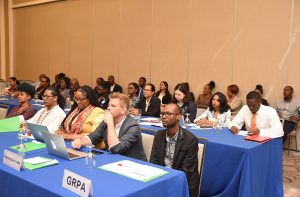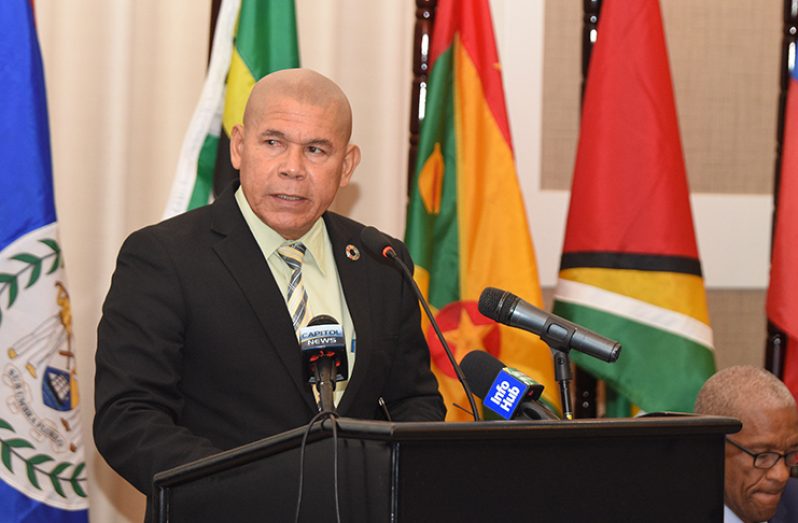– as region’s youths meet to discuss population, development
MINISTER of Social Cohesion Dr. George Norton has called on a cohort of youth leaders from across the Caribbean to dig deep; turn things on their head if needs be in their quest for a brighter future for the region.
“There is still so much work to be done; we’ve got some catching up to do. It is time for our youths to shine; to share their experiences; to nurture hope for a better future and, some might even say, challenge conventional wisdom,” he said.
The occasion was the opening here on Tuesday of the inaugural Caribbean Forum on Youth Population and Development.
Dr Norton, who has portfolio responsibility for Culture, Youth and Sport, was at the time addressing the gathering of youth representatives and senior CARICOM government officials at the Marriott Hotel with a message of encouragement and hope.
“The fact that youths are a nation’s greatest asset can never be overstated, and I know that as individual countries, we have all devoted time to empowering those that fall in this demographic,” Dr Norton said.
“I am pleased today that as members of CARICOM, we all have made some efforts to enable our young people to take the lead in our societies,” he added.
The Minister expressed his satisfaction that a broad range of topics would be discussed during the three-day event, but also called for dialogue to be held on matters regarding the development of rural youths in the Caribbean.
He said that through proposing practical solutions, the represented youth leaders and organisations can make the foregoing suggestion a reality, and work for the betterment of young people across the region.

The forum, he said, also presents the opportunity for attendees to design a Caribbean youth platform for attaining Sustainable Development Goals (SDGs).
“As youths and as officials responsible for youth development, the future of the entire CARICOM region rests on our shoulders here today in this room,” Dr. Norton said.
A FRESH COURSE
“So, we must make every effort to chart a fresh course to prosperity, involving our youths. This forum and many others like it will continue to have the fullest support and best wishes of the Government of Guyana and of myself,” he added.
Meanwhile, CARICOM Assistant Secretary-General for Human and Social Development Dr Douglas Slater stressed the need for the development of robust national youth polices. “More work is needed in members states in developing, monitoring and evaluating frameworks to assess progress towards youth development goals and to ensure that policy decision are based on evidence,” Dr. Slater said, adding:
“More attention is needed to ensure that policies are gender sensitive and properly funded so that they can be more impactful.”
He also called for matters of youths affected by crime, violence and abuse to be given focus, and for the facilitation of mainstream youth development across all sectors through budgetting and national development plans.
At the forum, the Caribbean Development Bank (CDB), one of the event’s stakeholders, highlighted a number of its investments over the years in youth development in the region. According to Vice-President of Operations, Ms. Monica La Bennett, the CDB has invested over US$1B in the education and training of youths; over US$200M for regional and national education training projects (2004-2016); and other assisting programmes.
She, however, said that persistent challenges such as poverty and vulnerability still remain, and presented statistics to show that 22 per cent of the men and women between the ages of 15 and 24, almost 17 per cent of the region’s total population, is estimated to be poor. This poverty, she said, is closely interlinked with social issues such high youth unemployment, risky behaviour and crime, and that it is hoped that through the forum, these and many other issues can be addressed.
Remarks came, too, from the United Nations Population Fund (UNPFA) Director of the Sub-Regional Office for the Caribbean, Ms. Alison Drayton and the United Nations Economic Commission for Latin America and the Caribbean (UNECLAC) Director, MS. Diane Quarless.
TAILORED POLICIES
Drayton pressed for tailored public policies to address the situation of youths and sexual and reproductive rights for young people, while Quarless urged the leaders to use their platforms to serve as critical agents of change.
A message came, too, from Suriname President and CARICOM Lead Head of Government for Community Development Desiré Bouterse which was read by Suriname’s Minister of Sports and Youth Affairs, Ms. Lalini Gopaul.
In that letter, President Bouterse commended the event’s involvement of youths in matters of sustainable development, and urged the gathering to use their voices to influence matters such as youth inclusion, climate change and violence during the forum.
Messages also came from Chairperson of the Caribbean Regional Youth Council, Shaquille Knowles who presented a joint statement on behalf of the organisation.
Throughout the three-day event, topics such as gender equality; youth political and civic participation and the role for older persons in the changing structure of family, community and workplace in the Caribbean will be discussed.
At the end of the forum tomorrow, a document of recommendations will be compiled to serve as guide for CARICOM Member states to monitor, evaluate and improve on their existing youth policies and programmes.



.jpg)








